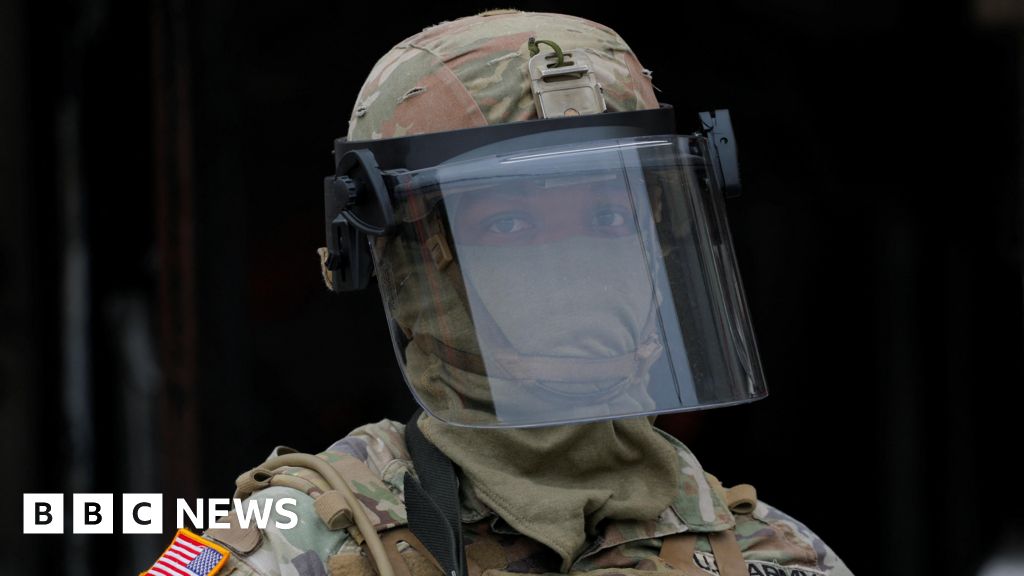ARTICLE AD BOX
Watch: Aerial view shows scale of Nova Scotia wildfires
By Nadine Yousif
BBC News, Toronto
Firefighters in Nova Scotia are battling the largest wildfire in the Atlantic province's history.
Officials say the fire on the southern tip of the province has burned more than 17,000 hectares, with flames reaching nearly 100m (328ft) in height.
Meanwhile, another fire that has forced the evacuation of thousands near Halifax, the largest city, continues to burn.
The wildfire smoke has travelled south, with air quality warnings in the US.
As of Thursday morning, Nova Scotia officials said the massive fire in Shelburne County in the south of the province is still burning. No fatalities or injuries have been reported, but around 50 homes have been destroyed as a result of the fire.
Dave Rockwood, a spokesperson with the Nova Scotia Department of Natural Resources, told reporters on Wednesday that the fire appears to be "very fast moving".
Mr Rockwood said firefighters have spotted flames as tall as 60 to 90m.
Around 5,000 people have been evacuated from the region, the local Royal Canadian Mounted Police (RCMP) division said.
They are in addition to another 16,400 people who were evacuated from a suburban area nearby Halifax due to a smaller, 836-hectare wildfire that has been burning since Saturday and has destroyed around 200 homes and structures.
On Wednesday, Nova Scotia officials increased the fine for breaking the provincewide burn ban - a restriction on outdoor fires - to C$25,000 ($18,000; £14,800) - a massive jump from C$237.50.
Your device may not support this visualisation
Officials said that smaller fire is more than 50% contained as of Thursday morning, but are fearful the flames may spread due to hot weather in the forecast.
"We are still dealing with a very dangerous and volatile situation," said David Steeves, a spokesperson with the Department of Natural Resources, adding the temperature could climb above 30C (86F) later in the day.
Officials said rain is not forecasted for the region until Friday, and that they remain unsure on when residents can return to their homes.
Canada's federal government also announced on Thursday that it will be sending more resources to help Nova Scotia battle the flames.
This includes military personnel, as well as additional firefighters to help relieve those who have been working on the ground for days.
More than 300 firefighters from the US and South Africa are heading to Canada in the coming days. Some will be sent to battle fires in Nova Scotia, while others will be sent to battle ongoing fires in Canada's western province of Alberta.
They will join firefighters from Australia and New Zealand who are already on the ground.
Image source, NASA Earth Observatory/ISS Crew Earth Observations
Image caption,The massive fire in Shelburne County has destroyed around 50 homes and forced the evacuation of 5,000 residents
Nova Scotia is seeing an unusually active wildfire season this year, part of a wider trend in Canada where the fire season has had an earlier start than normal.
Officials say that the number of wildfires across the country is on par with the 10-year average, but the amount of land burned - around 2.7m hectares in total - is unprecedented.
The fires have had an impact as far as the US, where air quality warnings were issued in Rhode Island and Massachusetts on Wednesday.
Some people in Boston have reported smelling smoke outside, according to reports in local media, while photos have shown a hazy sky over New York City on Tuesday as a result of the fires.
Nova Scotia officials said it remains unclear how the two fires started. Provincial officals
Experts say that while wildfires can be sparked by direct human involvement, natural factors, like strikes of lightning, can also play a huge part.
The cycle of extreme and long-lasting heat caused by climate change draws more and more moisture out of the ground and vegetation, resulting in conditions ripe for wildfires.

 2 years ago
47
2 years ago
47








 English (US) ·
English (US) ·